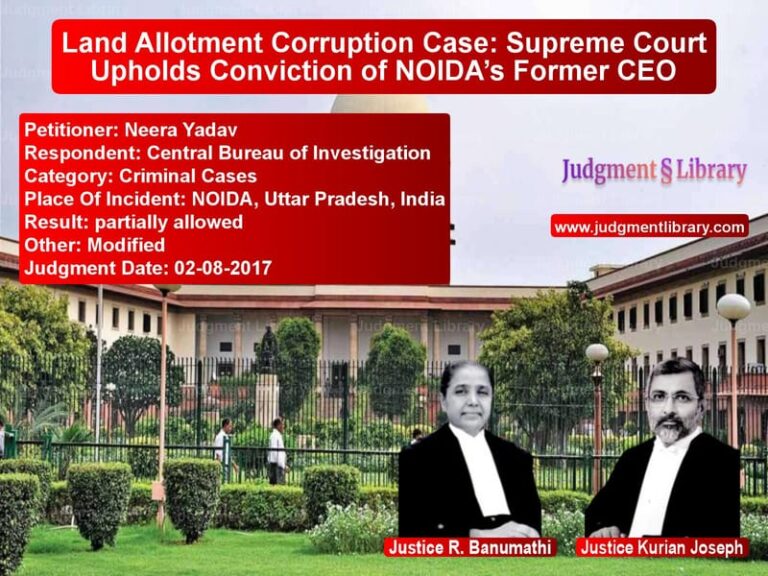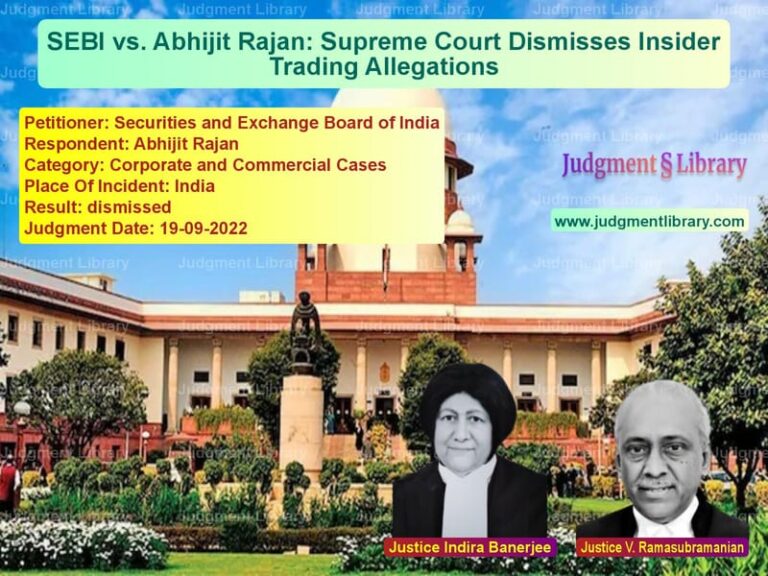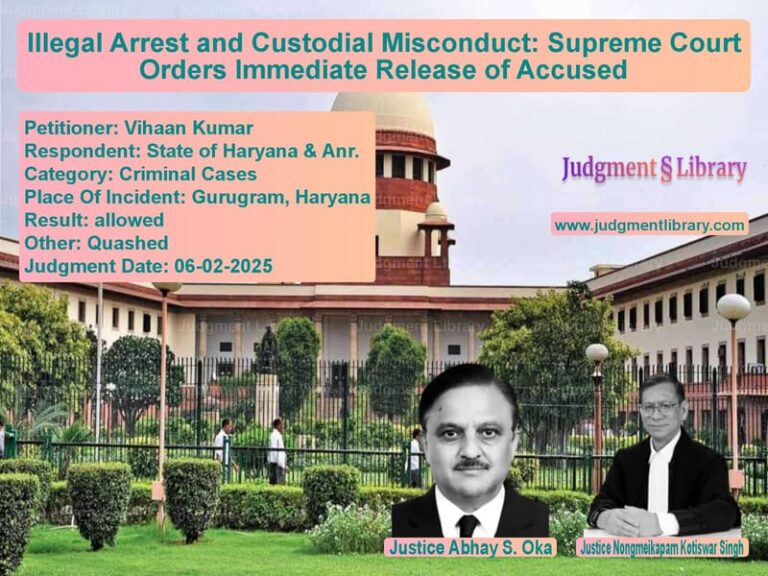Supreme Court Rules on Hindu Succession Act: Division of Coparcenary Property Clarified
The Supreme Court of India recently delivered a significant judgment in the case of Derha vs. Vishal & Anr., addressing the succession rights of coparcenary property under the Hindu Succession Act, 1956. The case involved the division of ancestral property among legal heirs, particularly focusing on the distribution of shares after the death of a Mitakshara coparcener.
Background of the Case
The dispute arose following the death of Phannuram Sahu on 22 June 1959. At the time of his death, he had a surviving interest in Mitakshara coparcenary property, which included:
- Agricultural land measuring 24.64 acres in Village Dhaneli
- House properties
Phannuram Sahu was survived by his children from two marriages:
- Kesar Bai (daughter from his first wife, Dukalhin Bai)
- Vishal (son from his second wife, Ganga Bai)
- Keja Bai (daughter from his second wife, Ganga Bai)
Both of Phannuram Sahu’s wives had predeceased him.
Partition and Legal Dispute
According to the appellant, Derha (son of Kesar Bai), a partition took place on 12 March 1964 among:
- Vishal
- Ramnath (Phannuram’s nephew)
- Manbat Bai (Phannuram’s sister-in-law)
Vishal inherited Phannuram’s one-third share in the coparcenary property but refused to grant a share to Kesar Bai. Consequently, Kesar Bai filed a partition suit (Civil Suit No. 146A of 1991) before the Civil Judge in Raipur, demanding her rightful share in the ancestral property along with mesne profits.
During the proceedings, Kesar Bai passed away on 17 June 1988, and her son, Derha, inherited her estate through a registered will dated 16 December 1980.
Trial Court’s Decision
The Trial Court, after examining the evidence, ruled on 6 November 1996 that:
- Derha was entitled to a one-third share in the agricultural land and house properties.
- He was also entitled to mesne profits at the rate of ₹400 per annum from 1979 until the property was partitioned and possession delivered to him.
Appeals and High Court Ruling
Aggrieved by the judgment, Vishal and Keja Bai filed an appeal (Civil Appeal No. 6A of 1998) before the District Judge in Raipur. However, on 13 April 1999, the appellate court dismissed the appeal in totality.
The case was then taken to the Chhattisgarh High Court through a second appeal (Second Appeal No. 891 of 1999). On 31 March 2009, the High Court modified the Trial Court’s judgment, holding that:
- Derha was entitled to only a one-sixth share in the coparcenary property.
Dissatisfied with the reduction in his share, Derha approached the Supreme Court.
Supreme Court’s Observations
The Supreme Court, comprising Justices C.T. Ravikumar and Sanjay Kumar, upheld the Chhattisgarh High Court’s ruling. The key observations made by the Court were:
1. Coparcenary Property and Succession
The Court ruled that the property in question was Mitakshara coparcenary property. Under Section 6 of the Hindu Succession Act, 1956, when a male Hindu dies, his interest in the coparcenary property devolves by survivorship unless he has Class I heirs.
2. Legal Share Calculation
The Court applied the legal principle from Gurupad Khandappa Magdum vs. Hirabai Khandappa Magdum (1978), which states:
“To ascertain the share of the heirs, one must first determine the deceased’s share in the coparcenary property as if a partition had occurred before his death.”
Based on this:
- Phannuram’s share in the coparcenary property was one-third.
- His share had to be further divided among his Class I heirs (Vishal, Kesar Bai, and Keja Bai).
- Each heir was entitled to one-sixth of the total property.
3. Rejection of New Arguments
The Court rejected Derha’s new argument that the property was not coparcenary but a jointly owned property. The Court stated:
“A party cannot take a contradictory stance to what was originally pleaded in the Trial Court.”
4. No Challenge to 1964 Partition
The Court also noted that the 1964 partition had never been challenged, and therefore, the appellant could not claim a larger share based on later interpretations.
Supreme Court’s Verdict
The Supreme Court dismissed the appeal, confirming that:
- Derha was entitled to one-sixth of the property.
- The remaining property was rightly distributed among the other heirs.
- There was no legal basis to interfere with the High Court’s decision.
- The interim status quo order from 9 October 2009 was vacated.
Impact of the Judgment
This ruling reaffirms key legal principles in Hindu coparcenary property disputes:
- Section 6 Application: The ruling clarifies the division of coparcenary property under the Hindu Succession Act.
- No Contradictory Arguments: Litigants cannot change their legal stance at a later stage.
- Finality of Partitions: Old partitions cannot be reopened unless specifically challenged.
- Equal Rights for Female Heirs: Daughters were given equal shares as sons, consistent with amendments to Hindu succession laws.
Conclusion
The Supreme Court’s judgment in Derha vs. Vishal & Anr. provides clarity on the application of Hindu succession laws, ensuring that property division is fair and legally sound. It upholds the rights of all heirs while reinforcing legal finality in property partitions.
Petitioner Name: Derha.Respondent Name: Vishal & Anr..Judgment By: Justice C.T. Ravikumar, Justice Sanjay Kumar.Place Of Incident: Village Dhaneli, Chhattisgarh.Judgment Date: 01-09-2023.
Don’t miss out on the full details! Download the complete judgment in PDF format below and gain valuable insights instantly!
Download Judgment: derha-vs-vishal-&-anr.-supreme-court-of-india-judgment-dated-01-09-2023.pdf
Directly Download Judgment: Directly download this Judgment
See all petitions in Succession and Wills
See all petitions in Property Disputes
See all petitions in Contract Disputes
See all petitions in Judgment by C.T. Ravikumar
See all petitions in Judgment by Sanjay Kumar
See all petitions in dismissed
See all petitions in supreme court of India judgments September 2023
See all petitions in 2023 judgments
See all posts in Civil Cases Category
See all allowed petitions in Civil Cases Category
See all Dismissed petitions in Civil Cases Category
See all partially allowed petitions in Civil Cases Category







